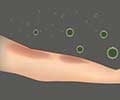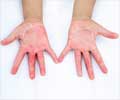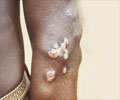Glossary
Dermatitis: Inflammation of the skin.Ringworm: A skin infection caused by a fungus that spreads out in an even circle, characterised by ring-like, scaly patches of red skin.
White blood cells: Cells which circulate in the blood and lymphatic system and harbor in the lymph glands and spleen. They are part of the immune system responsible for both direct and indirect immune response to fight against foreign invaders of the body.
Shingles: nerve infection due to the herpes zoster virus.
Kawasaki disease: A childhood disease causing fever, rash, skin peeling, swollen lymph nodes, and possibly complications of the heart and brain
Rosacea: A skin disorder that is characterised by patches of red skin on the nose and cheeks and acne-like bumps; most commonly occurs in middle-aged women.
Lactose Intolerance: The inability to digest or absorb lactose, a type of sugar found in milk and other dairy products.
















